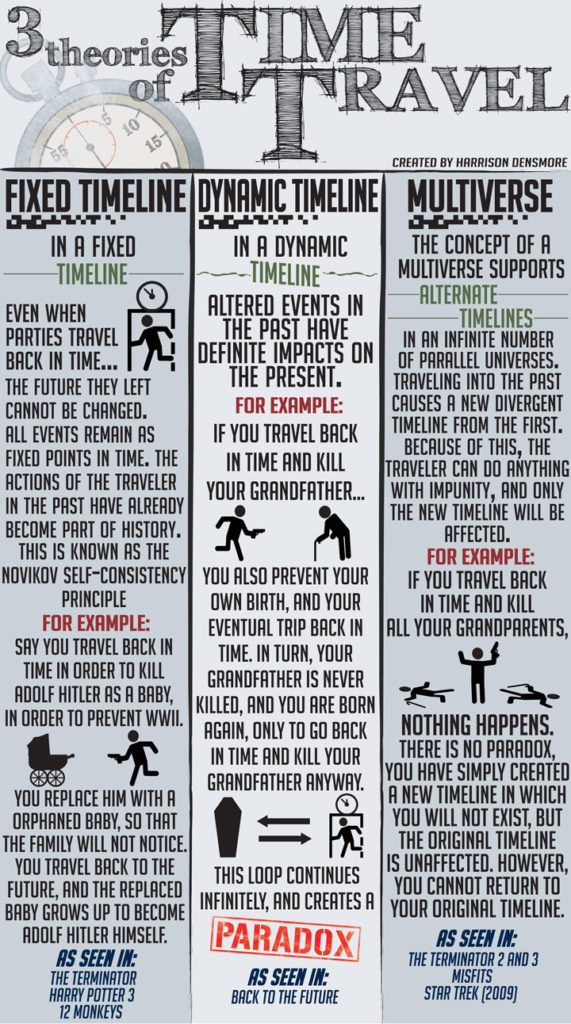My son, Ethan, posted a neat graphic by Harrison Densmore explaining three approaches to time travel in stories. It’s pretty good, actually. Check it out:
I think this is a great start, but it’s incomplete. There are at least six approaches to past time travel stories. Note that future time travel isn’t such a big deal: we do it all the time, and even know how to speed it up (travel at relativistic speeds).
Here’s the list I know.
- Time travel is impossible. The reason I mention this as one of the options is that a story can be about people attempting time travel, thinking something is time travel that actually isn’t, etc. I wouldn’t be surprised if this turns out to be the real one.
- The self-healing timeline. In this one, you travel back in time and change something, but the universe changes something else to cancel your change out. I’m not a fan of this one, because 1) why does the universe care?, and 2) two changes that cancel out one particular effect are not the same as not changing anything in the first place. For instance, what about the people whose lives would have been affected by the orphan?
- The timeline that’s smarter than you. This is the one Densmore calls “The Fixed Timeline.” In this one, any changes you make were what happened all along; you just didn’t realize it. Maybe you shot and killed your grandfather, and it turns out that wasn’t your grandfather at all, that’s just what grandma told your dad when he was growing up. I’m not crazy about this approach either, because it requires existence of some kind of intelligent Fate and imposes arbitrary limits on human intelligence. Humans may be intellectually limited, but we’re not stupid. Except sometimes, but that’s another discussion.
- Dynamic timeline. Densmore covers this one nicely. I think nature abhors a paradox, but you can still get fun stories out of this.
- Multiverse. This is the easiest one to work with, although I’d point out that some multiverse stories don’t restrict universe-hopping-so you might spawn a new version of the universe and experience it as long as you stay there, but be able to come back to your original timeline because your machine or magical ability or what have you is just that good.
- The elastic timeline. In this timeline, you can go back in time and do whatever you want, and the world will change accordingly (e.g., no baby Hitler), but when you return to your original time, nothing will have changed. In this approach, the universe is assumed to have some kind of resilience, or time travel to occur in some kind of pocket universe that vanishes when you leave it. I have an unfinished story that uses this approach in which a young man regularly travels back in time to kick the living crap out of horrible dictators from the past-just appears in Francisco Franco’s bedroom, for instance, and goes to town on him with steel-toed boots. As you can imagine, he comes to find this approach to happiness flawed.
So … what did I miss?
2 Comments
-

Actually, #3 does not require any kind of intelligent Fate or arbitrary limit on human intelligence. The classic thought experiment for this kind of time travel is the wormhole that has had one end (B) dragged at relativistic velocity and brought back near the other end. Because time has passed more slowly at that end of the wormhole, it is in the past relative to the other end (A). You plan to send a billiard ball through A on a carefully calculated trajectory that will cause it to emerge from B just in time to hit itself and prevent it from entering A, thereby causing a paradox. What will actually happen (according to the Novikov Self-Consistency Principle) is that the billiard ball will emerge from B at a different trajectory from what you had calculated, and will strike itself in such a way that instead of being knocked completely away from A, it will enter A on a trajectory that will lead it to emerge from B exactly the way it did.
This doesn’t happen because an intelligent Fate changed the course of the billiard ball. It happens because any other outcome is impossible.
So, in the go-back-in-time-and-kill-your-grandfather scenario, the very fact that you exist to go back in time means that you will not prevent the conception of whichever of your parents is his child. Again, this is not the result of an intelligent Fate acting to prevent you from killing your grandfather: it is simply impossible for you to do so because your own existence proves you failed.
-

Interesting, Eric … come to think of it, I used that approach in a story once, so I should have thought about it more clearly. On the other hand, some people do realize that approach by writing stories as though there is a Hand of Fate involved. I should just differentiate between that option and the inherent requirements of the approach!



